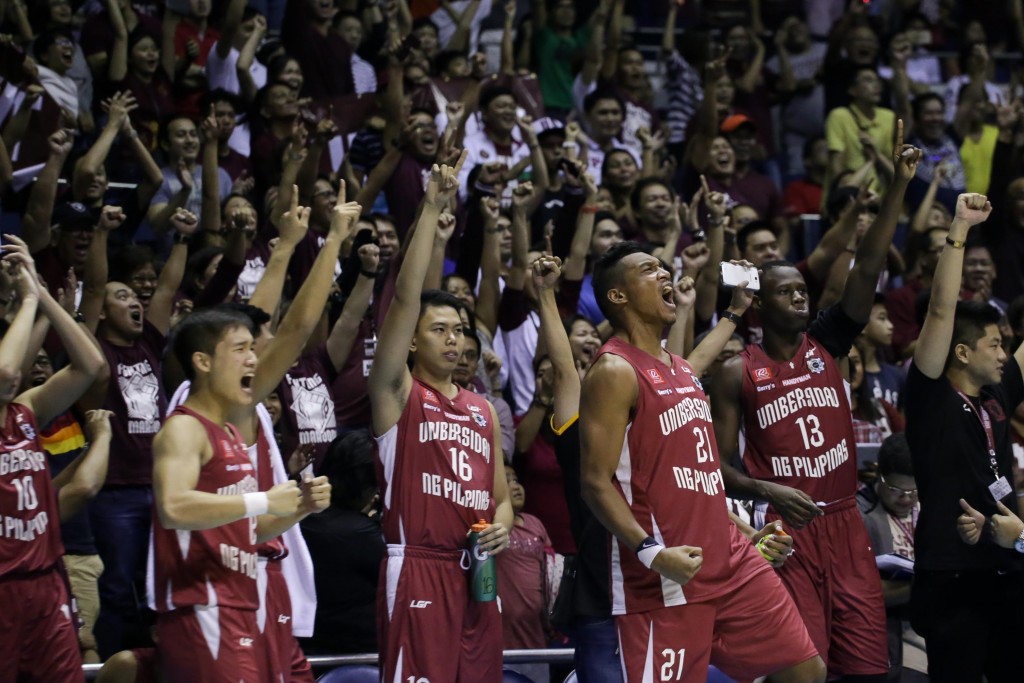Marooned no more
No victory feels too small for a team that has wallowed in varsity misery for decades. So when the University of the Philippines snapped a 27-game losing skid two years ago, the Fighting Maroons felt it was just right to celebrate with a campus bonfire.
That spontaneous party had all the feel of a championship victory—fireworks lit up the night sky and live music pumped up hundreds in the crowd as the players basked in the glow of the bonfire’s dancing flames.
But when the euphoria wore off weeks later, the Maroons got right back to reality: They’re still nowhere near the big guns in the country’s premier collegiate basketball league.
In came coach Dolreich “Bo” Perasol last season—the Maroons’ fourth mentor in as many years—who hoped, like those before him, to turn UP’s fortunes around.
His arrival came as a surprise. Just months after a roller-coaster, three-year stint with league heavyweight Ateneo, Perasol quickly took on the same role with UP, but with far different expectations.
Joining a high-profile squad like Ateneo comes with heavy pressure. When Perasol came on board, the Blue Eagles were fresh off a fifth straight title in the University Athletic Association of the Philippines (UAAP) men’s tournament.
Although the 44-year-old mentor steered the Blue Eagles to the Final Four twice, that’s not enough for a school boasting a lofty varsity standard. So Perasol opted to step down after his third and final contract year.
His alma mater soon came calling. But while Perasol got the traditional warm welcome, there’s a feeling of guarded optimism. The UP community, after all, had been used to the annual parade of coaches after a decade of futility.
Before Perasol took over, the Maroons have only won 17 of 140 games in 10 seasons—that’s a woeful 12.1 winning percentage—marked by infamous winless runs in 2007, 2010 and 2013.
So, unlike in Ateneo where Perasol had a clear-cut order to deliver a championship, the win-starved UP fans just wanted the team to show some fight.
“One reason why I accepted it was I saw the opportunity for me to contribute,” says Perasol. “I wanted to give it a try so we can at least improve our standings. I think now I know what it takes to have a team that can compete.”
To the players’ surprise, however, Perasol quickly found ways to get them out of the cellar. By the end of the UAAP eliminations, the Maroons finished tied for fifth with 2014 champion National University at 5-9. In fact, they were just a win short of forging a playoff for the last semifinal berth against Adamson in the season ruled by another traditional powerhouse, La Salle.
Although State U still wound up outside the Final Four, the Maroons’ five victories in one season turned out to be more than the team’s combined four wins in the last three years.
Moreover, combo guard Paul Desiderio became the first UP player in a decade to earn a spot in the Mythical Team with averages of 15.4 points and 7.1 rebounds. Marvin Cruz was the school’s last player to secure a spot in the league’s top five in 2006.
“What I really inculcated in their (players) heads … is we have to believe we’re just like anybody,” says Perasol. “That we can compete against them.”
Perasol wants his team, and perhaps even the fans, to change their mindsets. So while it’s nice to cheer small victories, the Maroons shouldn’t set their sights on small goals.
“Now that we won five, we can’t just have a goal of winning six or seven next season,” says Perasol. “The next logical thing is to go for the Final Four this season. Whether we like it or not, that’s the logical direction that we need to have.”
And it’s no lip-service as Perasol, together with team management, have taken steps to achieve a now-feasible Final Four stint. For one, UP stepped up its recruitment game with Ibrahim Ouattara, a 6-foot-9 find from the Republic of Mali, and Cebuano guard Jun Manzo.
“We want to let the community know that we’re doing something about the program,” says Perasol. “It’s a collaborative effort to make sure that basketball fans will feel there’s a direction, that we’re not just here to participate, and that our foremost objective is to win [a championship] finally.”
The recent acquisition of Nigerian center Bright Akhuetie from University of Perpetual Help—who’s set to suit up in 2018 when he meets the league’s mandatory residency period for transferees—also puts the Maroons on the list of future contenders.
“Some are asking now, ‘How do you manage expectations?” Perasol shares. “I tell them, let them expect. It has been a long time since anyone expected anything from us.” And Perasol knows the results that he wants: No more miseries for the Maroons.

